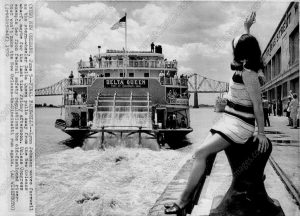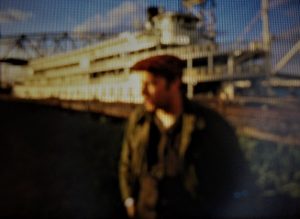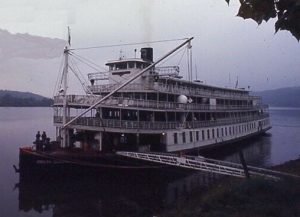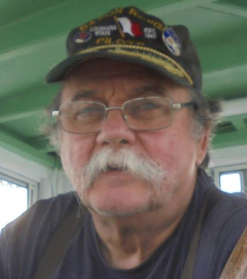The riverboat captain is a storyteller, and Captain Don Sanders will be sharing the stories of his long association with the river — from discovery to a way of love and life. This a part of a long and continuing story.
By Capt. Don Sanders
Special to NKyTribune
In 1970, some 51 years ago, the celebrated “Save the DELTA QUEEN” campaign, undoubtedly the highlight of the most exciting and eventful year in the historic steamboat’s narrative, culminated on the last day of the year when President Richard Nixon signed into law Congressional House Bill HR 6114.

The celebrated “Save the DELTA QUEEN” campaign, undoubtedly the highlight of the most exciting and eventful year in the historic steamboat’s narrative
Despite the year-long concerted efforts of the officials and employees of the DELTA QUEEN and company, along with hundreds of thousands of private citizens rallying in support of earlier legislation to exempt the QUEEN from the SOLAS, or “Safety at Sea Law,” a powerful Congressional opponent killed the amendment despite the support of 195 Congressional supporters.
The Safety at Sea Law prohibited boats and ships caring more than 50 people on overnight cruises originating from U. S. ports if the vessels contained combustible materials in their construction. The DELTA QUEEN, built upon a triple-galvanized steel hull, took pride in the variety of the many exotic wood species within her superstructure. Without an exemption at the end of the year, the QUEEN would be no better than any other maritime relic.
All the hoop-de-doo and ballyhoo favoring the exemption for the DELTA QUEEN was for naught had not Kentucky Senator Marlow Cook tacked a DELTA QUEEN amendment onto a private relief bill for a government employee owed back pay by the U. S. Government (Elmer M. Grade, HR 6114). Of course, the bill passed, as the government could not deny the pay for an employee if it were owed.

All the hoop-de-doo and ballyhoo favoring the exemption for the DELTA QUEEN was for naught had not Kentucky Senator Marlow Cook tacked a DELTA QUEEN amendment onto a private relief bill for a government employee.
The same Congressman who scuttled the first bill to exempt the QUEEN argued unsuccessfully to kill the amendment helping the QUEEN. Thankfully, he was overridden 295 to 73, thereby giving the steamboat a fresh breath of air for three years, and assured my employment for the upcoming year.
Nearly two months earlier, the DELTA QUEEN arrived in New Orleans at the Poydras Street Wharf on Monday, November 02, 1970, to the cheers of thousands of well-wishers, the watery plumes of fireboats, and circling television news helicopters.
That evening the crew joined the few remaining passengers around a rental TV set to watch and listen to Johnny Cash sing:
“So long DELTA QUEEN
Cincinnati to New Orleans.
Where you go you take a lot of dreams
So long DELTA QUEEN…
We will sure be missing you.”

Nearly two months earlier, the DELTA QUEEN arrived in New Orleans at the Poydras Street Wharf on Monday, November 02, 1970, to the cheers of thousands of well-wishers, the watery plumes of fireboats, and circling television news helicopters.
Early the next morning at 7:30 AM, the DELTA QUEEN departed Poydras Street Wharf for the Industrial Canal to lay up until word was heard from the Congress. In the lock, half-an-hour later, Second Mate Jim Blum and I scurried off and on the boat taking pictures to the extent that Captain Ernest E. Wagner, the QUEEN’s illustrious Master, barked at the both of us from the pilothouse wing bridge:
“Get yerselves back on the DELTA QUEEN… and quit messin’ with them cameras.”
At 08:30 AM, the Log Book of the DELTA QUEEN, in Captain Wagner’s handwriting, recorded:
“Tue. Nov. 3. Tied off at Galvas Wharf. End of the Line. AMEN”
That afternoon, all but a very few of us stayed aboard to clean-up before we, too, left, leaving Assistant Engineer Kenny P. Howe, Jr. and Chief Purser Gabriel Chengery as the only two aboard as Watchmen. Benton Roblee Duhme, a premier steamboat buff and the scion of one of St. Louis’s most prominent families who worked his way down the river on the “Last Trip” of the DELTA QUEEN as a porter and scullery boy, stayed with Gabe, Kenny, Joyce Sanders, and me to take photos of ourselves and the DELTA QUEEN. None of us figured we would ever get together again in such circumstances as the QUEEN had less than a decent chance for an exemption.

“Tue. Nov. 3. Tied off at Galvas Wharf. End of the Line. AMEN”
Sadly, that day was the last time any of us would see Benton again, who was in the final stages of a fatal disease and died in St. Louis on the 23rd of May, 1971, at age 23. Joyce and I did have a few more hours with him, though, after leaving Gabe and Kenny tending the QUEEN in the Industrial Canal. Before we drove young Duhme to the airport for a flight home, he invited us to join him as his guest at Antoine’s Restaurant in the French Quarter. To the amusement of the other diners, beside his proper British Tweed Jacket and tie, Benton wore a discarded, puffed-up “Captain’s Cap” he found while cleaning the boat, making him look like the Pillsbury Doughboy. He even carried an authentic DELTA QUEEN fire ax that Captain Wagner traded for a new one Benton bought, painted red, and lettered with the boat’s name in white letters not less than one-half inch in height.

We took photos of ourselves and the DELTA QUEEN. None of us figured we would ever get together again in such circumstances.
While boarding his flight at the airport, Benton explained the DELTA QUEEN’s plight to the flight crew, who gathered at the top of the boarding stairs while he pasted a “SAVE the DELTA QUEEN” bumper sticker onto the aluminum fuselage. I later learned the fire ax was secured in the cockpit of the aircraft and returned to Benton after the flight arrived in his hometown.
During the lull while waiting for the legislation’s outcome to exempt the QUEEN from the SOLAS, I met and shipped-out with Captain John Beatty aboard his newly acquired towboat, the SEMET, he renamed the CLARE. E. BEATTY. A detailed account here . . .and the story begins.
The DELTA QUEEN Log Book for December 28, 1970, three days before President Nixon signed into law Bill HR 6114, reads:
“DELTA QUEEN towed from Industrial Canal by Bisso Towing to Avondale Shipyards Inc. Gas-Free Dock, Bridge City, LA…”
Apparently, Overseas National Airways, the owners of the DELTA QUEEN, knew that Nixon was eager to sign the bill exempting the QUEEN, so they moved the lovely steamboat before the bill was law, knowing they could start preparing the boat for the extensive renovations and restorations that lay ahead at the beginning of 1971.
The Log Book entry for June 13, 1971, recorded:

Benton Roblee Duhme, a premier steamboat buff and the scion of one of St. Louis’s most prominent families who worked his way down the river on the “Last Trip” of the DELTA QUEEN as a porter and scullery boy.
“Str. DELTA QUEEN moved from Gas-free Dock … at Westwego. Arrived and moved onto dock at 11:45 AM.”
“Jan 14, 1971. Work Began on Hull. 7:00 AM”
“Feb 4, 1971. Str. DELTA QUEEN Removed from Drydock… Arrived at Wet Dock # 2, Avondale Shipyards, Inc.”
The Log also noted “ Severe damage inflicted to the Boiler Deck Portside Bulkhead” and Other Damage Done When the Bisso tug “Forced the [DELTA QUEEN] Against Empty Cargo Barge{Rake End}.”
Sometime in February, Captain Wagner sent for me, and when I arrived at Wet Dock # 2, no damage was apparent to the DELTA QUEEN cabin. Those Louisiana shipyard carpenters couldn’t be beaten anywhere on the river in those days, but they were expensive! In fact, all the shipyard workmen cost far more than our crew ever dreamed of earning.

Still today, those knowledgeable of the history and look of the DELTA QUEEN can date the boat as to whether a photograph was taken “before 1971” or “after 1970.”
With just a few regulars back at the boat, including Jim, Gabe, Kenny, and I, we were paying Avondale $14/ hour for a deck sweeper when fourteen bucks were like $90 in today’s inflated script. Of course, the fellow behind the broom was receiving only a small portion of the money in his pay envelope, and the bulk went to the shipyard for “fees.” It wasn’t long before Captain Wagner started sending for our veteran crewmen. Within days, Red Rooster, Ernest Johnson, Ernest Veasley, and others started showing up aboard the DELTA QUEEN, where a deckhand earned $35/week plus “three hots and a cot.”
Ahead of us lay, until April 14, 1971, when the National Trust for Historic Preservation chartered the DELTA QUEEN for the first trip of the new season, some of the most extensive renovations that transformed the QUEEN in ways unlike she’d seen up to that time in her 44 years. Still today, those knowledgeable of the history and look of the DELTA QUEEN can date the boat as to whether a photograph was taken “before 1971” or “after 1970.”

Handwritten lyrics to Johnny Cash’s song, “DELTA QUEEN,” 1970.
 Captain Don Sanders is a river man. He has been a riverboat captain with the Delta Queen Steamboat Company and with Rising Star Casino. He learned to fly an airplane before he learned to drive a “machine” and became a captain in the USAF. He is an adventurer, a historian, and a storyteller. Now, he is a columnist for the NKyTribune and will share his stories of growing up in Covington and his stories of the river. Hang on for the ride — the river never looked so good.
Captain Don Sanders is a river man. He has been a riverboat captain with the Delta Queen Steamboat Company and with Rising Star Casino. He learned to fly an airplane before he learned to drive a “machine” and became a captain in the USAF. He is an adventurer, a historian, and a storyteller. Now, he is a columnist for the NKyTribune and will share his stories of growing up in Covington and his stories of the river. Hang on for the ride — the river never looked so good.

























What a contrast between the 1970 Activity and what is (not) happening now. I became familiar with the Legislative process when we were sweating the Kings Point Permanency Bill.
Now, Any Hope? The wavier has Passed, that seems to be all. Any real River People involved?
As always, I’ve enjoyed the story. My hope springs eternal for the Delta Queen and her return to cruising. I look forward to the story you write about that fine day!
Thanks for the comments. Here’s hoping we see the old DELTA QUEEN running again,
Thanks for the first hand account of what has become a legendary story.